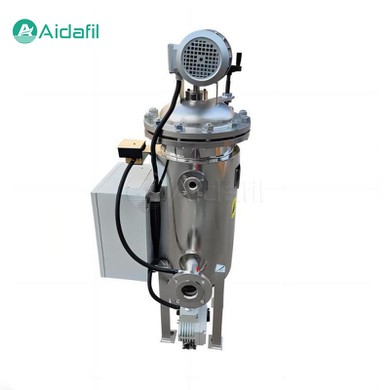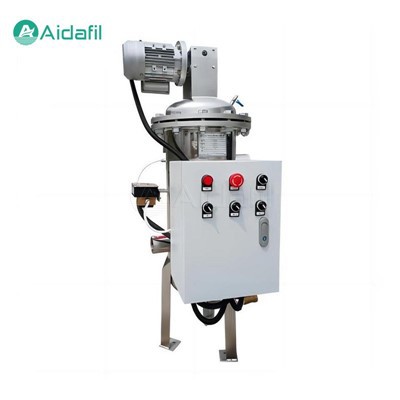
Automatic Controlled Self-Cleaning Filter
The automatic controlled self-cleaning filter is a highly intelligent and automated filtering device. It is usually composed of a filter body, a filter screen, a cleaning mechanism, a control system, etc.

The automatic controlled self-cleaning filter is a highly intelligent and automated filtering device. It is usually composed of a filter body, a filter screen, a cleaning mechanism, a control system, etc. The filter body is a chamber that holds fluid and performs filtration; the filter screen is a key component for intercepting impurities; the cleaning mechanism is used to clean the filter screen; and the control system is responsible for monitoring and directing the entire working process.
When the fluid enters the filter, the impurities are blocked by the filter screen. With the continuous accumulation of impurities, the pressure difference between the inlet and outlet of the filter will gradually increase. When the pressure difference reaches the set value or after a certain period of time, the control system will start the cleaning procedure. During the cleaning process, the filter can still maintain a certain filtration function and achieve continuous operation.
Parameters
|
Single unit flow |
50-1200M3/H, larger flow can be realized by multiple single units in parallel |
|
Minimum working pressure |
0.2Mpa |
|
Maximum working pressure |
1.0/1.6/2.5/4.0Mpa |
|
Maximum operating temperature |
80°C |
|
Filtration accuracy |
130~3500 microns |
|
Control mode |
Differential pressure, timing or manual |
|
Cleaning time |
60s |
|
Cleaning mechanism speed |
14-20rpm |
|
Cleaning pressure loss |
0.01Mpa |
|
Control voltage |
AC 220V |
|
Rated operating voltage |
Three-phase, AC220V /380V, 50HZ |
Characteristics
Automatic controlled self-cleaning filters have the following characteristics:
1. Highly automated. Able to automatically detect, judge and perform cleaning operations without excessive manual intervention.
2. Continuous operation. Clean the filter screen without interrupting the filtration process to ensure a continuous supply of fluid.
3. Efficient filtration. It can effectively remove various types of impurities and particulate matter to ensure good filtration effect.
4. Self-cleaning ability. Self-cleaning is achieved through a specific mechanism to maintain the smoothness and filtration performance of the filter.
5. Intelligent control. With a precise control system, the cleaning parameters can be adjusted flexibly according to the actual situation.
6. Low maintenance costs. Reduces the workload and frequency of manual maintenance, reducing overall costs.
7. Strong adaptability. Can adapt to different fluid media, flow and pressure conditions.
8. Compact design. Compact structure, small footprint, easy installation and layout.
9. Long life. Using high-quality materials and reasonable structural design, it has a long service life.
10. Easy to operate. Friendly man-machine interface, convenient and fast operation and monitoring.
11. Reliable and stable. Stable and reliable operation, can maintain good performance under various working conditions.
Application field
The application field of automatic controlled self-cleaning filter is very wide, mainly including the following aspects:
1. Industrial water treatment. Filtration of circulating water and cooling water from chemical plants, power plants, steel plants, etc., to remove impurities and protect equipment.
2. Petrochemical. Used for the filtration of crude oil, refined oil, etc., to ensure the quality of oil products.
3. Municipal water supply. Pretreatment of urban water supply to improve water quality.
4. Wastewater treatment. Help remove larger particulate matter in wastewater plants, providing better conditions for subsequent treatment.
5. Food and beverage industry. Ensure the cleanliness of production water and prevent impurities from affecting product quality.
6. Seawater desalination. Pretreatment of impurities in seawater to improve desalination efficiency and effectiveness.
7. Paper industry. Filter impurities in pulp to improve paper quality.
8. Mining. Filter mineral processing water, etc.
9. Electronics industry. Provide pure water for ultrapure water preparation, etc.
10. Agricultural irrigation. Purify irrigation water to prevent clogging of sprinklers and other problems.
Determination of cleaning frequency
The determination of the cleaning frequency of automatic controlled self-cleaning filters usually takes into account the following factors:
1. Inlet water quality. If the impurity content of the incoming water is high, the particles are large or complex, the cleaning frequency may need to be higher; if the water quality is relatively good, the cleaning frequency can be appropriately reduced.
2. Filter flow rate. When the flow rate is faster, impurities may accumulate faster, requiring more frequent cleaning.
3. Filter mesh aperture. Smaller apertures are prone to faster clogging, and the cleaning frequency will increase accordingly.
4. Working time. The longer the continuous operation time, the more impurities may accumulate and require more frequent cleaning.
5. Differential pressure setting. By setting a reasonable differential pressure threshold, cleaning is triggered when the differential pressure is reached, and the differential pressure setting value will affect the cleaning frequency.
6. System Requirements. Adjust the cleaning frequency according to the requirements of the entire system for water quality and flow stability. If the requirements are high, the cleaning frequency may be too fast.
7. Empirical data. Refer to the experience and historical data of similar application scenarios to initially determine the appropriate cleaning frequency, and then adjust and optimize according to the actual operation situation.
FAQ
1. Q: What is the function of a filter?
A: The main function of a filter is to remove solid particles, impurities, and harmful substances from liquids or gases, in order to achieve purification, clarification, and protection of equipment.
2. Q: How to choose a suitable filter?
A: When choosing a filter, factors such as the properties of the material being filtered (e.g., viscosity, temperature, corrosion), required filtration accuracy, processing capacity, operating pressure and medium, as well as the type, material, size, and installation method of the filter should be considered.
3. Q: What is the working principle of a filter?
A: The working principle of a filter mainly relies on physical screening, deep interception, absorption, or chemical reactions to remove impurities or harmful components from the material being filtered.
4. Q: How to maintain and care for a filter?
A: Maintenance of filters includes regular cleaning or replacement of filter elements, inspection of seals and fasteners, maintaining stable operating pressure, and avoiding overloading. Specific methods should be referenced from the filter's instruction manual and maintenance guides.
5. Q: What is the service life of a filter?
A: The service life of a filter depends on its working environment, processing volume, and filtration accuracy. Generally, when the filter's pressure drop reaches a certain value or the filtration effect decreases significantly, it needs to be replaced or cleaned.
6. Q: What should be paid attention to during filter installation?
A: During filter installation, attention should be paid to the directionality, ensuring that the fluid enters and exits from the correct ports. Also, the piping system should be cleaned before installation, and the filter should be securely fastened and sealed as required by the instructions.
7. Q: What is the replacement cycle for filters?
A: The replacement cycle for filters depends on their working conditions and filtration requirements, and is usually indicated by pressure difference indicators or timers. When the filter's pressure drop reaches the set value or the filtration effect decreases, it should be replaced in a timely manner.
Why Choose Us
· Professional manufacturer with many years' experience
· Good quality with competitive price
· OEM & ODM are welcome
· Various payment items are acceptable
· Good service by experienced manager
AIDA Philosophy
1. Management Concept:
· Satisfy the customers' demand --- Touch customers, trust with our products and services
· Make employees happy --- Pursue higher material and spiritual happiness
2. Company Mission:
· Focus on customer needs, provide best filtering solution
· To be the lifelong partner with customers
3. Corporate Vision:
· Become a global purification leadership brand
4. Values:
· Customer: Pursue the ultimate experience, enjoy excellent quality
· Team: Trust, responsibility, growth, win-win
· Work: Simple, sincere, efficient, dedicated
Hot Tags: automatic controlled self-cleaning filter, China, factory, price, buy, Separator Filter, high precision automatic self cleaning filter, air filter cartridge in screw compressor, Air Compressor Oil Separator, pleated media compressor air oil separator, durable air filter element







